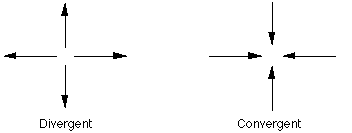| Divergence and Convergence | 2007-01-08 14:07 6 comments |
 by Flemming Funch by Flemming FunchGroup activities can be divergent or convergent. Like, say, a meeting. One might have a divergent meeting or a convergent meeting. A brainstorming session is divergent. It goes off into many directions, but might be starting at a central point. One throws out all sorts of crazy ideas, and later one might find that some of them are great, even though lots of them aren't. And that's the point. Maybe one starts by being at a stuck point, having some kind of problems, an impasse, and one is seeking renewal. But the brainstorming session itself might not actually change things. It merely is an act of creativity, putting out as many ideas as possible, as quickly as possible, no matter what direction they go in. If one has something specific to accomplish, one needs a convergent activity. I.e. it needs to end up at a decision, a solution, or an agreement. That could consist of examining various alternatives, excluding the ones that won't work, and ending up with fewer. It might be to invite opinions on pros and cons, and maybe ending with a consensus. Or maybe a vote, and choosing a particular avenue to follow. Or it might be hammering out a particular plan, step by step. One way or another, the desired outcome is that there's one clear direction to follow. One probably doesn't come up with revolutionary new ideas if one is having a meeting based on a convergent model. And on the other hand, one probably doesn't end up with an action plan if one engages in a divergent activity like brainstorming. One can very well sequence several distinct activities, and have phases that are either convergent or divergent. For example, in Getting Things Done, David Allen describes what he calls the "Natural Planning Model", which has these five steps: 1. Defining purpose and principles 2. Outcome visioning 3. Brainstorming 4. Organizing 5. Identifying next actions So, if you have something to plan, there's probably an intention and a purpose behind it. Something that drives you to get together for that purpose. The Why. And usually there are some guiding principles already in existence. Then you'd visualize what you'd like to accomplish. The What. If you do what you want to do, what would it look like and feel like? After that comes brainstorming. Everybody comes up with ideas, information, problems, scenarios, pieces of the puzzle, wild dreams, etc. Then you organize what you've got. If you've got enough details and enough ideas, you work out some sense in them, sort them, discard stuff, set priorities, etc. Finally you decide what's next. How do you proceed? What do you do first? Is there a next meeting? 3 is obviously a divergent activity. We could probably say that 2 is too, as it starts with a purpose and visualizes something based on that. 1, 4 and 5 would be convergent. And after the plan is done, what comes after might well be considered divergent, as one starts with the agreed plan, and goes off in different directions to do each one's part. So, an effective way of working something out is quite likely to be a proper sequence of converging and diverging activities. Breathe in, breathe out, wax on, wax off. There would naturally be a bunch of anti-patterns to match a model like the one given. I.e. bad ways of planning something. Like, starting with good ideas before one has agreed on what the purpose of the activity is. Or starting to write the plan without having assembled the available information and ideas. Or taking action and just working harder without having done any of this. Different tools and different environments might lend themselves more or less well to divergent or convergent activities. A brainstorming session can work well if everybody can get busy at the same time, yelling out ideas, or scribling them on post-it notes and putting them on the wall. But if only one person at a time could be in action, and he had to get up in front of the room, it might flow less well. Same thing with software tools. A blog is great for putting out anything one feels like writing about, but it doesn't end up being any particularly neat result. It isn't a convergent tool. A wiki would be better for that, where one could write and re-write, and somebody else might come along and correct something, or clarify something. But a wiki is also divergent, as one can easily go off into different directions, without having any mechanism for getting it summarized into a result. There are actually rather few software tools that inspire convergence. Most programs you use give you plenty of ways of being distracted and going off on tangents. Web-pages, e-mails, instant messages, all of them give you plenty of material for jumping off into totally different directions, and there's no obvious end-point anywhere. Automated tools might come along later and provide some points of convergence, like showing us what are the most popular subjects of the day. But there's a bit of a lack of tools for helping groups converge on action plans. The pro of divergence is that it brings out new information and might get you out of what you're stuck in. The con is that it might distract you from what you ought to already be doing. The pro of convergence is to focus on getting a result. The con is that it might be the wrong result and one doesn't have the elements one needs to make it happen. |